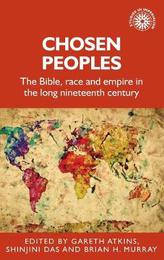
|
Chosen Peoples: The Bible, Race and Empire in the Long Nineteenth Century
Hardback
Main Details
| Title |
Chosen Peoples: The Bible, Race and Empire in the Long Nineteenth Century
|
| Authors and Contributors |
Edited by Gareth Atkins
|
|
Edited by Shinjini Das
|
|
Edited by Brian Murray
|
| Series | Studies in Imperialism |
|---|
| Physical Properties |
| Format:Hardback | | Pages:240 | | Dimensions(mm): Height 234,Width 156 |
|
| Category/Genre | Colonialism and imperialism
History of religion |
|---|
| ISBN/Barcode |
9781526143044
|
| Classifications | Dewey:325.3209034 |
|---|
| Audience | |
|---|
| Illustrations |
2 black & white illustrations
|
|
Publishing Details |
| Publisher |
Manchester University Press
|
| Imprint |
Manchester University Press
|
| Publication Date |
11 February 2020 |
| Publication Country |
United Kingdom
|
Description
Chosen peoples demonstrates how biblical themes, ideas and metaphors shaped racial, national and imperial identities in the long nineteenth century. Even as radical new ideas challenged the historicity of the Bible, biblical notions of lineage, descent and inheritance continued to inform understandings of race, nation and empire. European settler movements portrayed 'new' territories across the seas as lands of Canaan, but if many colonised and conquered peoples resisted the imposition of biblical narratives, they also appropriated biblical tropes to their own ends. These innovative case-studies throw new light on familiar areas such as slavery, colonialism and the missionary project, while forging exciting cross-comparisons between race, identity and the politics of biblical translation and interpretation in South Africa, Egypt, Australia, America and Ireland.
Author Biography
Gareth Atkins is Bye-Fellow and College Lecturer in History at Queens' College, Cambridge Shinjini Das is a Lecturer in Modern Extra-European History at the University of East Anglia Brian Murray is Lecturer in Nineteenth-Century Literature at King's College London -- .
Reviews'The flag follows the cross and in this case reaffirms it. The received understanding is that the Age of Enlightenment put to rest the dominance of religion in modern Western cultures. This collection proves Christianity and its political avatar nationalism truly underscored the age of empires. The impact was as profound on indigenous nationalisms, with subordinated societies discovering their distinct identities in the wake of first contact with colonizing Christians. Among the many case studies is Khoisan national renewal in the Cape Colony: Jared McDonald examines Christian liberation as a means to racial equality (albeit short-lived) in British South Africa. The Bible as 19th-century political testament echoed the late medieval struggle between an imperial, all-powerful church and the desire for national congregations to access the word of God in their national languages. Centralization was at odds with dissemination, a conflict the Russian czarist confessional state experienced rather keenly. Atkins (history, Queens' College, Cambridge, UK), Das (modern extra-European history, Univ. of East Anglia, UK), and Murray (19th-century literature, King's College London, UK) clearly establish that the Bible was alive and well in the long 19th century.' --J. L. Meriwether, Roger Williams University Summing Up: Recommended. Lower-division undergraduates through faculty. Reprinted with permission from Choice Reviews. All rights reserved. Copyright by the American Library Association. -- .
|